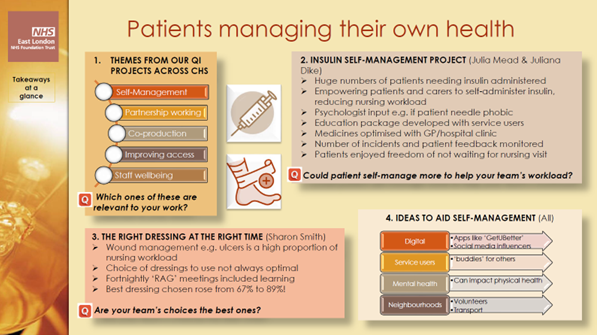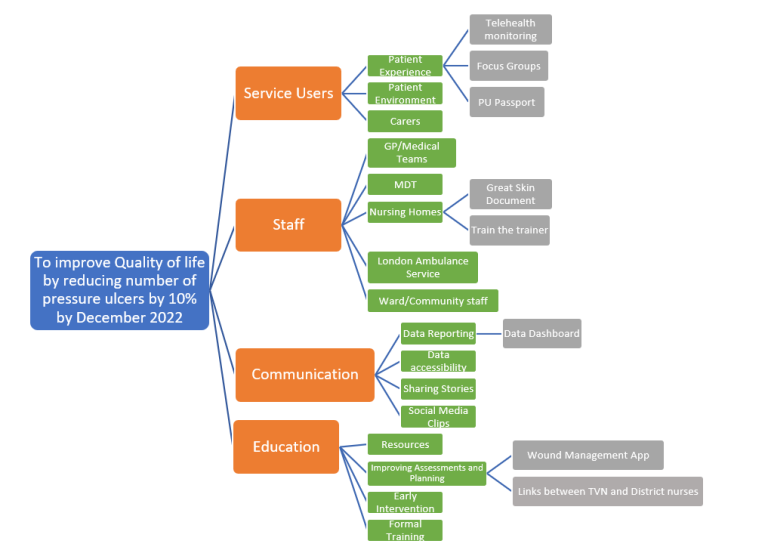
Sharing Learning Across Community Health Services
6th November 2024
Written by Dr Alex Harborne (Clinical Director for Tower Hamlets Community Health Services), Dr Rajeev Shah (Clinical Director for Newham and Bedfordshire Community Health Services), Jo Moore (Associate Director for Quality Improvement), William Diaz (Improvement Advisor) and Clarissa Sørlie (Improvement Advisor)
The first ever joint Quality Improvement (QI) Forum between Bedfordshire, Newham and Tower Hamlets Community Health Services (CHS) was held virtually this month. Each directorate in ELFT has its own QI Forum, a space to share updates on local quality improvement initiatives. However, this month, colleagues, service users and carers from across the three directorates came together to share learning from quality improvement projects around the theme of ‘self-management’.
Planning for the event has been six months in the making, inspired by a visit from the Institute for Healthcare Improvement (IHI) in April of this year. At the IHI visit, attendees from across Tower Hamlets and Newham CHS shared learning across their boroughs and heard a summary of work taking place in Bedfordshire CHS. It quickly became apparent that there are significant opportunities for sharing learning between the three directorates, and the idea for a periodic joint QI Forum was born.
The inaugural Joint CHS QI Forum took place on 22nd October, chaired by Dr Alex Harborne (Clinical Director for Tower Hamlets CHS). The theme of ‘self-management’ was chosen by survey votes from people across the directorates.
The first presentation came from Julia Mead (Associate Director for Bedfordshire CHS; Nursing) and Juliana Dike (Diabetes Specialist Nurse in Tower Hamlets). Together, they have been working to promote self-management of diabetes across Bedfordshire, Newham and Tower Hamlets. The directorates are each testing different change ideas and coming together regularly to share learning and expertise. The Tower Hamlets team are starting to see results, and have so far helped 35 people to independently manage their insulin.
For the second presentation, Sharon Smith (Pressure Ulcer Improvement Facilitator in Newham) shared her work to ensure that patients are given the right dressing at the right time. As a result of this project, the team have increased the number of patients with the most appropriate dressing from 67% to 89%. This initiative has improved patient outcomes, reduced the need for nursing visits and reduced waste.
Attendees were then invited to reflect in breakout rooms about what their own teams could do to promote self-management. This prompted rich discussions about how teams can improve the start of a patient’s journey, for example by clarifying expectations, discussing goals, and starting self-management strategies earlier in the diagnosis of long-term conditions. There were also conversations about the power of stories, social media and communities to inspire others to try self-management. There was a theme throughout of working collaboratively with service users and carers.
Dr Raj Shah (Clinical Director for Bedfordshire and Newham CHS) summarised learning from the event in the infographic below (see Figure 1):

Figure 1. Infographic summarising themes from the CHS QI Forum
Reflecting on the success of the event, Dr Raj said, “There’s something reassuring about seeing colleagues grappling with same sort of issues as we are – and really helpful to share solutions to save reinventing the wheel. Really great to see colleagues following up and connecting in the meeting chat, by e-mail and in person.”
Dr Alex Harborne added, “It was a privilege to chair the first ever joint CHS QI Forum, an educating, energising and empowering session on self-management with CHS colleagues from across Bedfordshire and London. It was a great opportunity to share learning from QI projects and improve patient care together! Thank you to all the many CHS staff and service users who attended. Can’t wait for the next one!”
Planning is now underway for the next QI Forum, which will be based on the theme of ‘partnership working’. Themes identified for future sessions include co-production, improving access and staff wellbeing.
For more information, please contact clarissa.sorlie1@nhs.net
Most Read Stories
-
Why is Quality Control important?
18th July 2018

-
2016 QI Conference Poster Presentations
22nd March 2016
-
Recognising Racism: Using QI to Help Take Action
21st January 2021

-
QI Essentials: What does a Chief Quality Officer do?
18th March 2019

-
Using data enabled us to understand our problem
31st March 2023

-
The Power of Data in Reducing Pressure Ulcers
12th January 2022


Follow QI on social media
To keep up to date on the latest concerning QI at ELFT, follow us on our socials.


